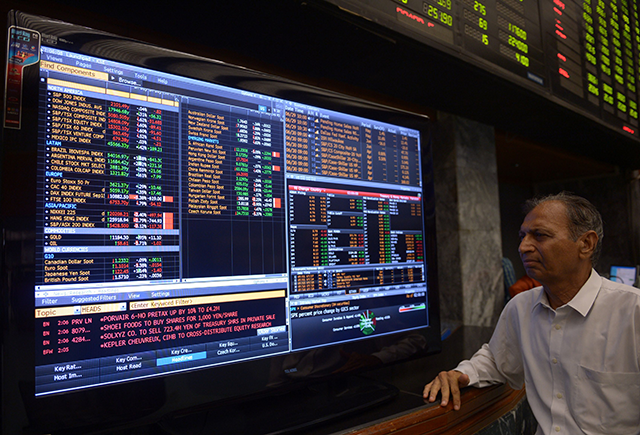PSX forecasts record surge of 106,000 points by June 2025
Anticipated growth driven by IMF prospects, reforms

A leading local research house has revised the outlook for the Pakistan Stock Exchange (PSX), foreseeing the benchmark index reaching 87,000 points by December 2024 and 106,000 points by June 2025.
The projected growth in the benchmark KSE 100 index hinges on securing the next International Monetary Fund (IMF) loan programme of $6-8 billion, expected between June and July 2024, and ensuring timely economic reviews by the Fund.
In a comprehensive report titled ‘Index to Reach 87,000 by December 2024 and 106,000 by June 2025 – Price-to-Earnings Ratio Revert to Its Mean in 3 Years,’ Topline Research has upped the growth forecast for the benchmark KSE 100 Index by an additional 20% for December 2024, compared to the earlier anticipation of 75,000 points by the end of the ongoing calendar year.
“Due to expected monetary easing, deregulation of non-essential pharmaceutical prices, lower inflation, and gradual addressal of recurring circular debt, we anticipate that high-leverage, pharma, consumer, and circular debt-affected companies/sectors will attract investor attention in the next 12 months,” said the research house.
The index reached a new record high closing at 73,085.50 points on Friday (May 10), marking a 17% rise from 62,451 points at the end of December 2023, when the research house had previously predicted a 75,000-point level for December 2024.
Before Pakistan secured an IMF $3 billion Stand-By Arrangement in late June 2023, the index had declined to around 40,000 points. Timely economic reviews, meeting most IMF conditions as per schedule (such as increasing oil, gas, and petroleum product prices), and initiating talks for the next IMF programme all contributed to the market hitting new all-time highs about a dozen times in the past six months or so.
The research house argued that despite recent recovery, the price-to-earnings (PE) ratio – the share price of stocks in multiple of their respective earnings per share – has remained below the historical average of around 7 multiple. The expected return to the average over the next three years supports the upward revision in the index level for December and June.
However, the research house downgraded economic growth to 2.5% for the ongoing fiscal year 2023-24 from the previous projection of 3%, amid a downward revision in industrial and services sectors growth.
Agricultural output, however, is anticipated to rebound to a multi-year high of over 5% in FY24.
The current PE is expected to linearly revert to its historical average over the next three years of the IMF programme (Jul 2024 – Jul 2027), “subject to successful implementation of the programme and its conditionalities with respect to fiscal/monetary discipline and structural reforms.”
For FY25, real GDP is estimated to grow between 3.5-4% from its earlier projection of 3.5%. The upward revision has taken place after incorporating the government’s crop target numbers for the next season along with a slight positive adjustment in services numbers considering negligible growth in the last two years.
The inflation estimate for FY25 includes hikes in power tariffs, rent, wheat prices, fuel prices, and gas tariffs.
Topline Research expects interest rates to witness cumulative cuts of 500-600 basis points by June 2025, with a real interest rate assumption of 300-400 basis points.
“We anticipate that the forward PE by June 2025 will rise to 4.6 multiple from the current PE of 3.7 multiple, leading to our index target for Jun 2025 of 106,000, providing a return of 46%.”
The economic challenges ahead, especially in areas of external repayments, fiscal, and energy issues, are significant. The timely initiation, regular reviews, and successful completion of IMF programmes will help in building the required foreign exchange reserves and improving sovereign credit ratings.
The upcoming Extended Fund Facility (EFF) is expected to be supplemented by climate finance, with funds varying between $6-8 billion.
Industrial growth is now expected at 2.6% (earlier: 3.7%), while services growth is assumed at 1.4% (earlier 2.2%), and agricultural growth is anticipated to be 5.1% in FY24, the highest in percentage terms after 18 years, mainly due to rebounds in cotton, wheat, and rice production.
Published in The Express Tribune, May 12th, 2024.
Like Business on Facebook, follow @TribuneBiz on Twitter to stay informed and join in the conversation.



















COMMENTS
Comments are moderated and generally will be posted if they are on-topic and not abusive.
For more information, please see our Comments FAQ